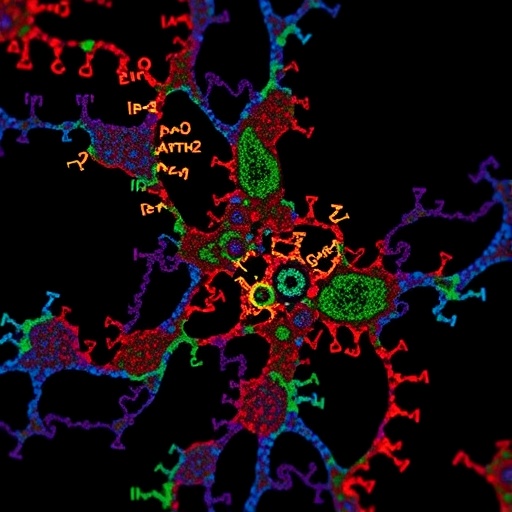In the realm of genetics, few topics command as much attention as the BRCA2 gene and its implications in familial breast and ovarian cancers. This gene, a crucial player in DNA repair mechanisms, has long been under the spotlight of genetic research, yet its intricate transcriptional complexity remains partially understood. In a groundbreaking study, Adamopoulos, Boti, and Athanasopoulou, alongside their colleagues, have ventured into this complexity, employing an innovative sequencing method dubbed Hybrid-seq to decode the multifaceted layers of BRCA2 transcriptional regulation. Their findings promise to reshape our understanding of how BRCA2 mutations promote oncogenesis.
BRCA2, or Breast Cancer 2 gene, is a pivotal gene that encodes a protein responsible for maintaining genomic stability. Mutations in BRCA2 are well-associated with a significantly heightened risk of developing breast and ovarian cancers. While its role in the repair of DNA double-strand breaks through homologous recombination is established, the nuances of BRCA2’s transcription remain elusive. This study delves into the gene’s transcriptional landscape, paving the way for new insights into cancer predisposition and prevention strategies.
The researchers utilized the Hybrid-seq methodology, which combines the advantages of both long-form and short-form sequencing techniques. This method allows for a comprehensive capture of the entire transcriptome, ensuring that even the most complex variants of BRCA2 transcripts are identified and characterized. By overcoming the limitations of traditional sequencing methods, Hybrid-seq enables the elucidation of previously unrecognized splice variants and regulatory elements within the BRCA2 gene.
Upon examining the transcriptional profiles generated through Hybrid-seq, the research team uncovered an intricate network of alternative splicing events. This discovery emphasizes that BRCA2 is not merely a static gene with a set number of transcripts; instead, it operates within a dynamic framework where various isoforms can potentially influence protein function and gene expression control. This has profound implications for understanding how specific BRCA2 mutations manifest in cancer phenotypes.
Furthermore, the study identified novel regulatory elements that modulate BRCA2 transcription in response to DNA damage signaling. These findings suggest that the expression levels of BRCA2 may vary significantly under different cellular stress conditions, which might contribute to the development of cancer when these regulatory pathways malfunction. The research team speculates that the dysregulation of BRCA2 transcription in the context of mutagenic stress may be a critical factor underlying tumorigenesis in BRCA2 mutation carriers.
The implications of these advances extend beyond theoretical considerations. With greater insight into BRCA2 transcription, we may refine personalized medicine approaches for individuals with BRCA2-related cancers. Understanding specific splice variants or regulatory mechanisms could facilitate more targeted interventions, whether it be through tailored surveillance strategies or novel therapeutic modalities that address the root of genomic instability.
Moreover, the study highlights the potential for leveraging Hybrid-seq technology in other research domains, particularly in exploring gene expression patterns associated with complex diseases. The robustness of Hybrid-seq in unveiling diverse transcriptomic landscapes could greatly enhance our capacity to identify key regulatory networks in various pathological contexts beyond just BRCA2.
Public health discussions around genetic testing often focus on the clear-cut aspects of mutation detection; however, this research underscores the necessity of understanding the full range of gene expression variations. For those at risk of hereditary cancers, the intricate details of how BRCA2 is transcribed can yield critical insights that go beyond binary mutation status.
As genetic counseling continues to evolve, the knowledge gained from this study could lead to improved communication between patients and healthcare providers. It calls for a reassessment of how genetic risk is conveyed, emphasizing the importance of incorporating insights about transcriptional complexity into risk assessment and management discussions.
The research also beckons a futuristic view where transcriptomic profiling may become a standard part of genetic counseling. It raises questions about adopting comprehensive genetic assessments that transcend simple variant identification, looking instead at the broader picture of gene expression regulation.
In conclusion, the work spearheaded by Adamopoulos and his colleagues contributes significantly to our understanding of BRCA2’s transcriptional intricacies. By deploying Hybrid-seq, the study lays a foundation for future research aimed at demystifying the complexities of this influential gene. As we continue to unravel the cryptic layers of genetic regulation, we stand on the brink of a new era in precision oncology, where targeted interventions are guided not just by the presence of mutations but by a nuanced understanding of gene behavior.
In a world where the fight against cancer is paramount, such advances are not only timely but essential. The road ahead holds promise for enhanced cancer prevention strategies, early detection methods, and the development of novel therapeutics that could stem from these newfound understandings of the BRCA2 gene.
As scientific inquiry advances, it becomes increasingly evident that the complexity of gene expression demands our full attention. The findings from this research remind us that the story of each gene is multifaceted and that ongoing exploration is critical to advancing human health.
The implications of this research reach far beyond the laboratory, offering hope to countless individuals grappling with the specter of hereditary cancer. As we decode the complexities of the BRCA2 gene, we inch closer to a future where cancer outcomes can be significantly improved through precise and informed medical strategies.
Subject of Research: The transcriptional complexity of the BRCA2 gene and its implications in cancer genomics.
Article Title: Decoding the Transcriptional Complexity of the Human BRCA2 DNA Repair Gene Using Hybrid-seq.
Article References: Adamopoulos, P.G., Boti, M.A., Athanasopoulou, K. et al. Decoding the Transcriptional Complexity of the Human BRCA2 DNA Repair Gene Using Hybrid-seq. Biochem Genet (2025). https://doi.org/10.1007/s10528-025-11180-6
Image Credits: AI Generated
DOI: Not provided.
Keywords: BRCA2, gene transcription, cancer genetics, Hybrid-seq, DNA repair, genomic stability, alternative splicing, cancer prevention strategies.




